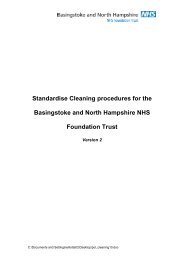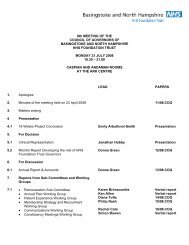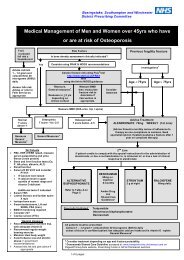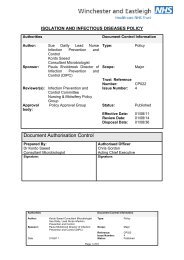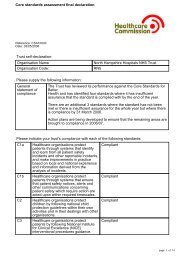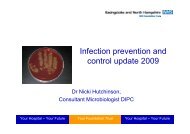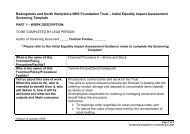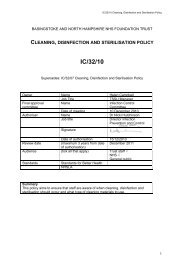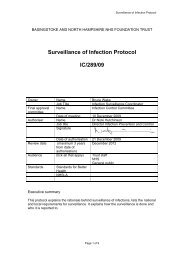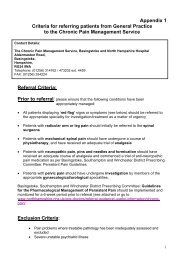Policy for the management and control of diarrhoea and vomiting
Policy for the management and control of diarrhoea and vomiting
Policy for the management and control of diarrhoea and vomiting
You also want an ePaper? Increase the reach of your titles
YUMPU automatically turns print PDFs into web optimized ePapers that Google loves.
Winchester & Eastleigh Healthcare NHS Trust<br />
POLICY FOR THE MANAGEMENT AND CONTROL OF DIARRHOEA<br />
AND VOMITING (NOROVIRUS) INFECTIONS<br />
8 PATIENT MANAGEMENT AND TREATMENT<br />
8.1 Treatment<br />
8.2 Currently <strong>the</strong>re is no effective antiviral treatment <strong>for</strong> noroviruses. It is a self<br />
limiting illness which will usually cease within a few days. It is important to<br />
ensure prompt fluid replacement to prevent dehydration <strong>and</strong> its complications.<br />
8.3 There is a sample patient, relatives <strong>and</strong> carer’s in<strong>for</strong>mation leaflet available<br />
on <strong>the</strong> intranet, ref 308 “Norovirus”. Copies <strong>of</strong> this leaflet are available from <strong>the</strong><br />
IPC team.<br />
8.4 What to do if you suspect <strong>the</strong>re is an outbreak?<br />
8.5 If you have 2 or more cases <strong>of</strong> unexplained <strong>diarrhoea</strong> <strong>and</strong> / or <strong>vomiting</strong><br />
or nausea on your ward, ei<strong>the</strong>r staff or patients, you may be at <strong>the</strong> start <strong>of</strong> an<br />
outbreak. It is <strong>the</strong> responsibility <strong>of</strong> <strong>the</strong> nurse in charge to contact <strong>the</strong> Infection<br />
Prevention & Control Team (IPC Team) on ext 4483 or 5170 immediately <strong>for</strong><br />
fur<strong>the</strong>r advice. (See Appendix 1).<br />
8.6 Out <strong>of</strong> hours <strong>and</strong> during <strong>the</strong> weekend <strong>the</strong> nurse in charge must discuss this<br />
with <strong>the</strong> on-call Consultant Microbiologist or night site coordinator <strong>and</strong> ei<strong>the</strong>r<br />
email <strong>the</strong> Infection Prevention & Control Nurses (IPCNs) via <strong>the</strong>ir generic email<br />
address or leave a message on <strong>the</strong>ir answer-phone (x5170) so <strong>the</strong>y can follow<br />
up on <strong>the</strong> next working day. See 8.9 below <strong>for</strong> a provisional decision on ward<br />
closure.<br />
8.7 There are several different actions which must be taken, some according to <strong>the</strong><br />
number <strong>of</strong> patients who are affected, but isolation <strong>of</strong> cases on <strong>the</strong> same ward<br />
<strong>and</strong> prevention <strong>of</strong> transfers from <strong>the</strong> ward are both critical. Fur<strong>the</strong>r, <strong>the</strong><br />
Consultant Microbiologist will make a decision as to whe<strong>the</strong>r to close or<br />
partially close <strong>the</strong> ward to admissions to bring <strong>the</strong> situation under rapid <strong>control</strong>.<br />
Early discussion is key as every situation is different. Examples <strong>of</strong><br />
requirements <strong>for</strong> <strong>control</strong> are as follows:<br />
a. Move symptomatic patients into side rooms, close <strong>the</strong> bay <strong>for</strong> 48 hours,<br />
consider o<strong>the</strong>r patients in that bay as contacts <strong>and</strong> monitor <strong>for</strong><br />
development <strong>of</strong> <strong>diarrhoea</strong> <strong>and</strong> / or <strong>vomiting</strong>. Review this with <strong>the</strong> IPC<br />
team.<br />
b. If numbers exceed side room capacity, cohort nurse, symptomatic<br />
patients <strong>and</strong> <strong>the</strong>ir contacts. Patients with a positive Clostridrium difficile<br />
result must not be cohort nursed with patients with <strong>diarrhoea</strong> due to<br />
ano<strong>the</strong>r cause. Patients with Clostridium difficile should be moved to <strong>the</strong><br />
cohort ward (Victoria Ward or o<strong>the</strong>r ward if so designated in <strong>the</strong> future).<br />
c. Send specimens on all affected cases to <strong>the</strong> Microbiology laboratory.<br />
Authorities<br />
Document Control In<strong>for</strong>mation<br />
Author:<br />
Dr Parnaby<br />
Type:<br />
<strong>Policy</strong><br />
Consultant Microbiologist<br />
Sponsor: Members <strong>of</strong> <strong>the</strong> Infection Prevention & Scope:<br />
Major<br />
Control Committee<br />
Reference:<br />
CP101<br />
Issue Number: 2<br />
Date July 2011 Status: Published<br />
Page 8 <strong>of</strong> 26



